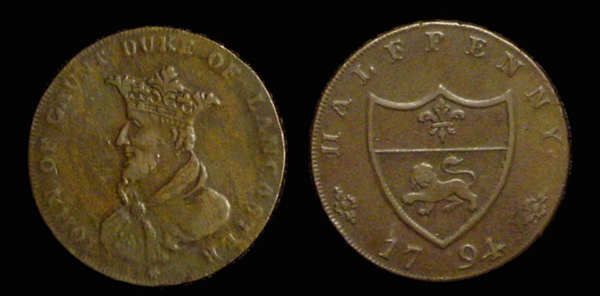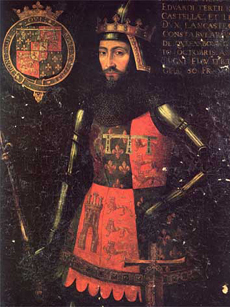
HALF PENNY TOKEN - LANCASHIRE - JOHN OF GAUNT
(D&H 43)
Date: A.D. 1794
Obverse: Portrait crowned head left - JOHN OF GAUNT DUKE OF LANCASTER
Reverse: Coat of arms - HALFPENNY 1794
 |
Lancashire D&H 43, Lancaster Halfpenny Depicting John of Gaunt In the late 1600's to the late 1700's copper coinage was produced sporadically, sometimes not at all, for various reasons. Conder Tokens (named after James Conder) are copper coins (usually pennies and half pennies) Printed by towns, businesses, and organizations of all types to meet a need for low denomination coinage to pay wages and make change. Thousands of varieties of tokens were minted and many are beautiful and intricate. John of Ghent (or Gaunt) was the fourth son of King Edward III and Queen Philippa born at Ghent in 1340. While still an infant he was made Earl of Richmond and admitted into the Order of the Garter. In 1359 he married Blanche youngest daughter of Henry, Duke of Lancaster. Upon the death of his father-in-law in 1361, he acquired the title of Duke of Lancaster as well as Earl of Derby, Lincoln and Leicester, and the high office of Steward of England. He also became one of the wealthiest land owners in the north of England. Blanche died in 1369 and in 1371 he remarried to Constanza, the eldest daughter of King Pedro (Pedro the Cruel) of Castile and Leon who had recently been killed by his illegitimate brother Henry of Transtamare who then succeeded him to become Henry II. By his marriage to Constanza, John assumed the title King of Castile and Leon and his pursuit to place himself on the throne of Spain would become an obsession. John of Gaunt was no stranger to war though it seems he was not outstanding at it either. His three incursions into France in 1369, 1370 and 1373 earned him little praise and honors but instead made him rather unpopular as on his third campaign he lost a considerable number of his followers in the mountains of Auvergne. After the death of his elder brother Edward of Woodstock (also known as the Black Prince) in 1376, the Duke of Lancaster rose in prominence in his elderly fathers court and was given more duties concerning the administration of public affairs. Upon the death of his father in 1377, his 10 year old nephew Richard II ascended to the throne and John continued to govern the Kingdom as he had done during his fathers failing health. Although his enemies made claims that he conspired to take the throne for himself, the reality seems to be quite the opposite as he took care to show that he was loyal to the new king and had no designs on his position proclaiming in parliament that anything said of him to the contrary was a malicious lie. To accentuate this he withdrew from any prominent role in government for a time taking a command on the Scottish border. He was there when his Savoy palace was burnt during the peasant's revolt in June 1381, an event in part caused by Johns own failed policies as regent. He soon turned his attention to his aspirations in Spain in 1382 proposing an invasion to take the throne but domestic concerns found him again on the Scottish border. Court intrigue attempted to paint him as a possible usurper when, in 1384, his less than stellar campaigns in Scotland and failure to arrange peace there made him unpopular with his nephews fickle court favorites and he became a target of those trusted by the young King. John again vigorously denied any aspirations to take the throne for himself. Growing discontent and intrigue made a foreign campaign that would take him away from such strife all the more desirable. In 1836 he got his chance and he left England with a large force to take his Spanish throne. Allied with John of Portugal his forces took Galicia prompting King Juan (who had succeeded his father Henry as the king of Castile) to offer a truce by marrying Johns daughter to his son and heir. John refused and continued his campaign into Castile where further success eluded him and his army was virtually disabled with illness. He was eventually forced to accept King Juan's renewed offers of a truce by marriage and abandon his quest for the Spanish throne. In 1389 he returned to England having avoided intrigue there with his absence. King Richards position was growing more tenuous and he welcomed his uncle back. To show his renewed favor he bestowed upon John the title of Duke of Aquitaine and John, who was ever loyal, renewed his support for the King. During four years he exercised his influence in favor of pacification at home, and was chiefly responsible for the conclusion of a truce with France and bringing about relative stability by helping to settle disputes and preventing armed rebellion and all out civil war. Constance died in 1394, not long after he took as his third wife Catherine Swynford who had been his mistress for many years thus making her four children born by him legitimate but barred them from any claim to the throne. Regardless, from his eldest son with Swynford, Beaufort, 1st Earl of Somerset, came a granddaughter, Margaret Beaufort, whose son would claim the throne and become King Henry VII of England. His son from his first Marriage, Henry Bolingbroke, who had had already been forgiven for the part he played in the armed rebellion against the King as a member of the Lords Appellant again found himself in trouble. In 1398 he was banished from the Kingdom for ten years with the reluctant approval of his father to avoid a blood feud between him and Thomas de Mowbray, 1st Duke of Norfolk, who was exiled for life. John of Gaunt Died the next year on February 3, 1399 at Leicester Castle and was buried at St. Paul's near the high altar. His son was denied his father inheritance and would return and eventually imprison and depose King Richard and take the throne to Rule as King Henry IV of the Royal house of Lancaster. In the end John never became King of either England or Spain but from him would issue forth future generations of kings. He was not the greatest of soldiers or statesmen but he was ever loyal to his family and the throne and his level headed self-restraint never allowed himself to be provoked to treason. He played an important and pivotal role in the politics of the day as a force for unity and compromise helping to calm tensions between the King and court during a tumultuous time. John is also remembered as the patron of the poet Geoffrey Chaucer. |
